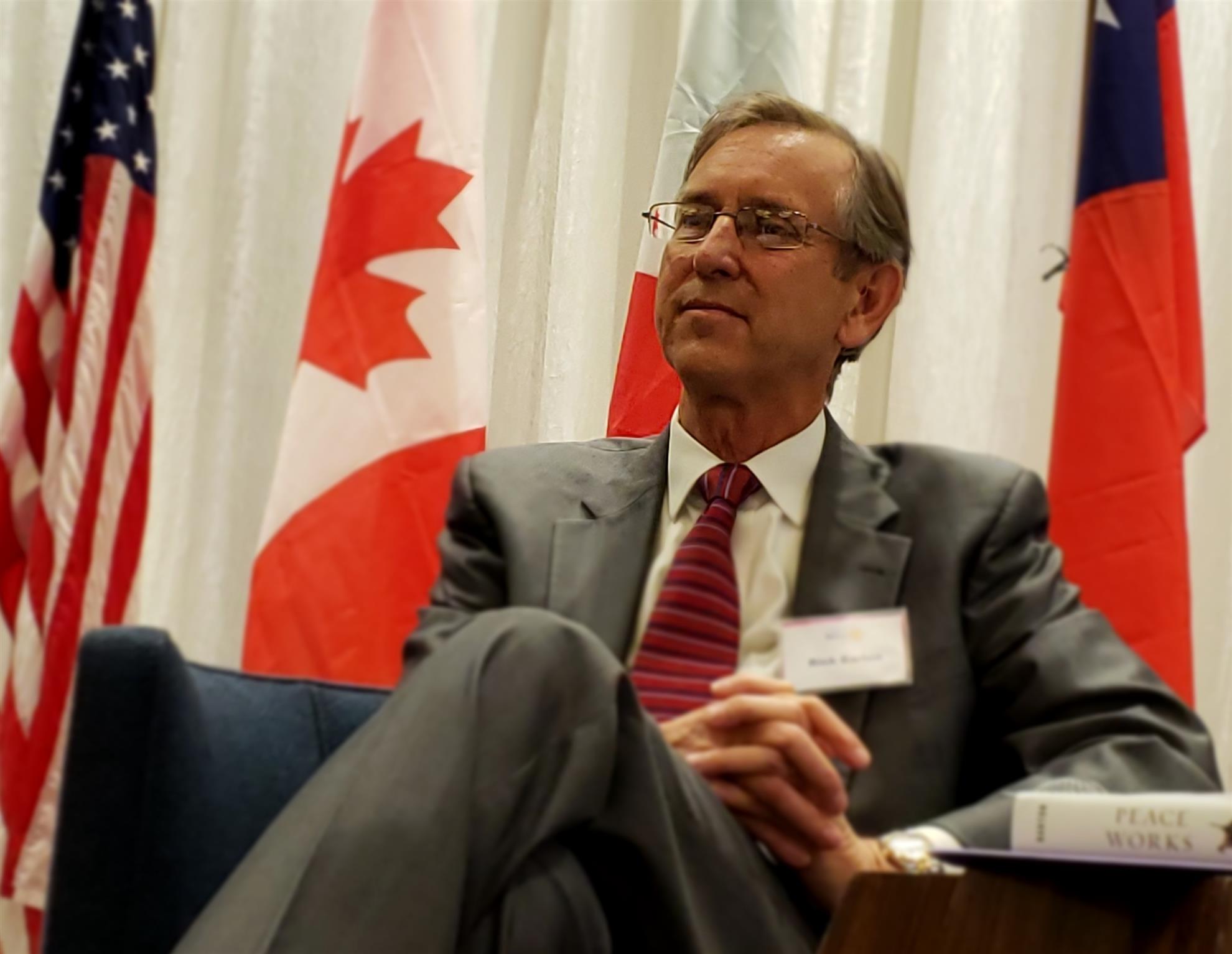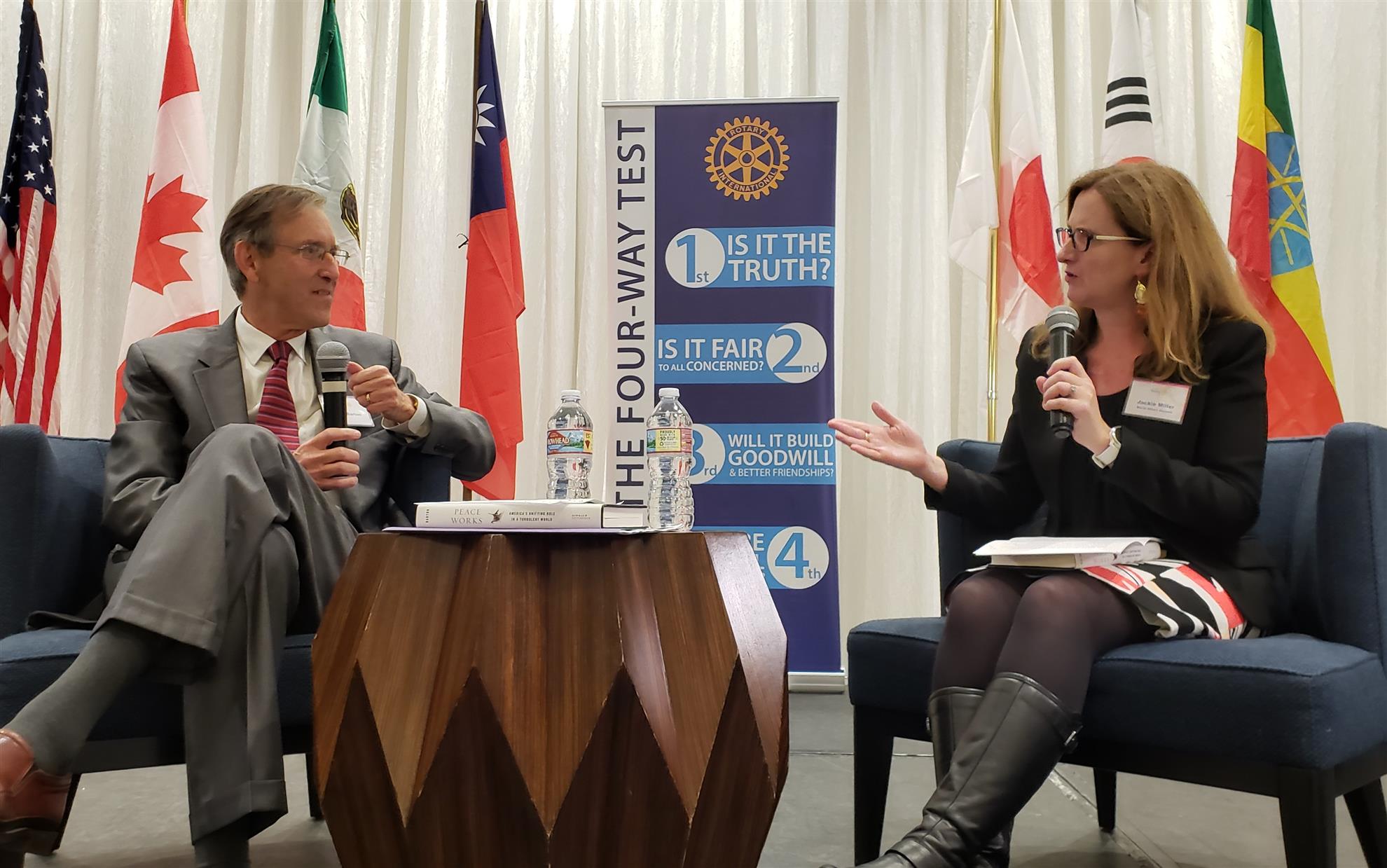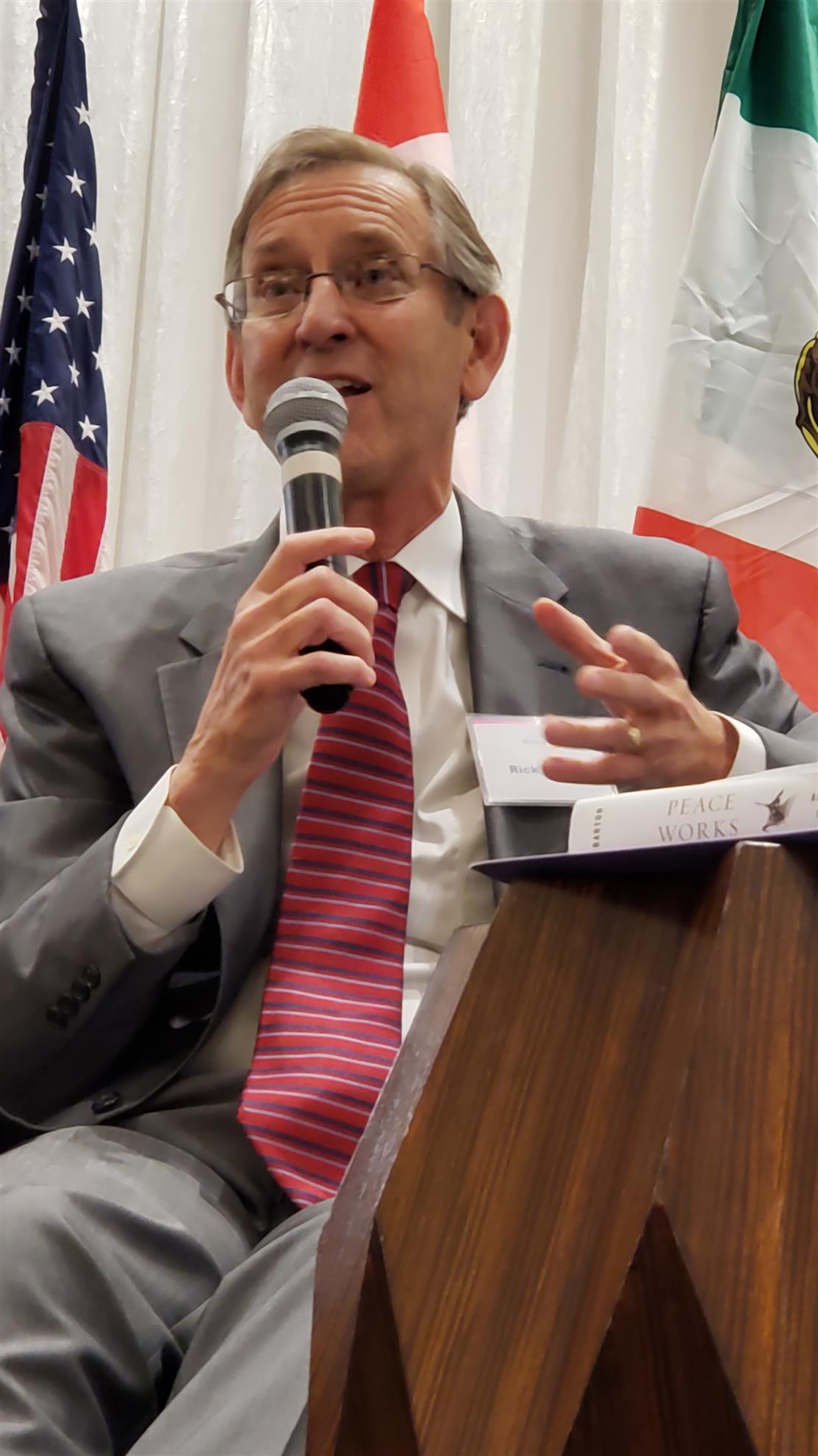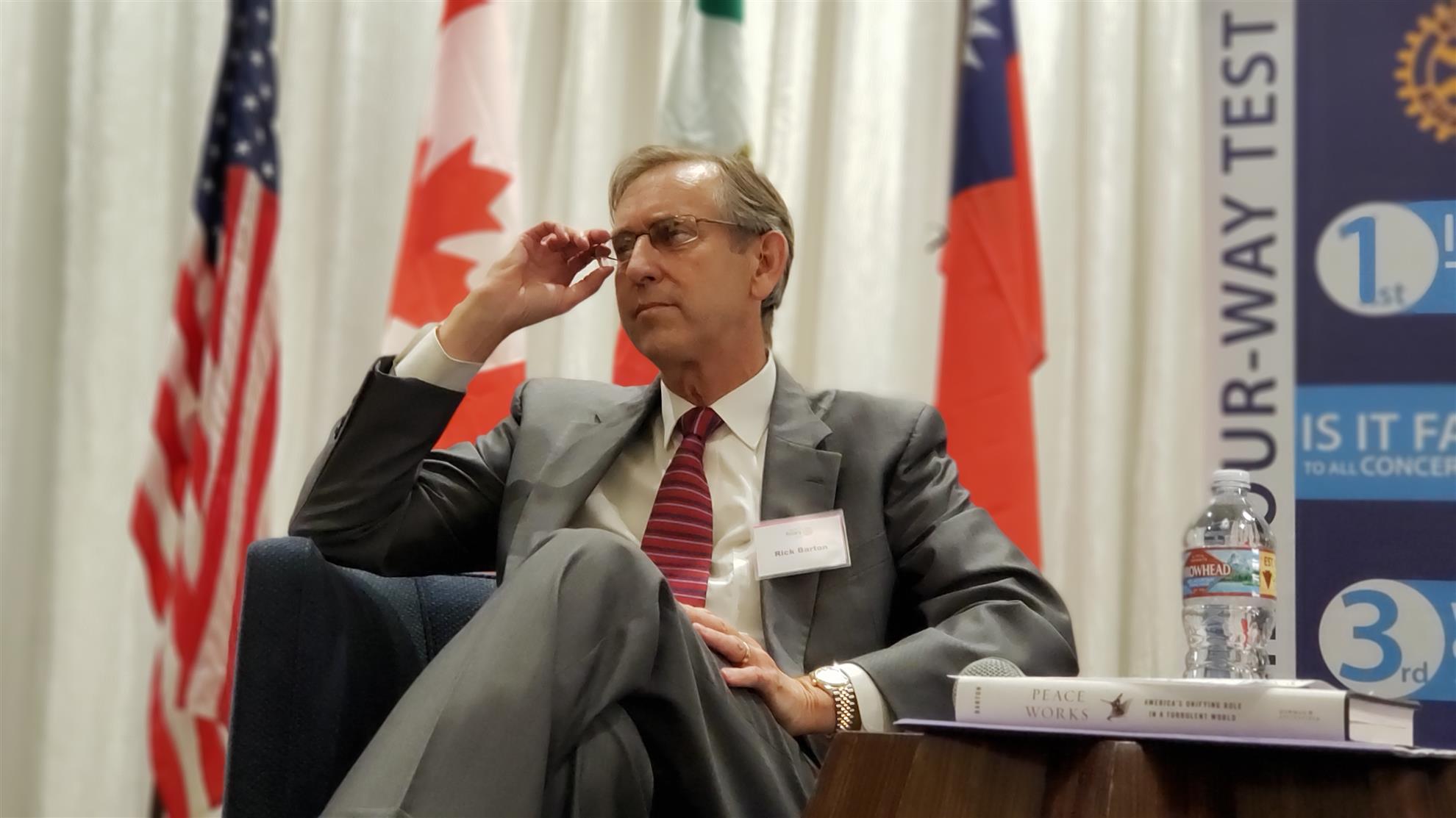 America’s unifying role in global peacebuilding was the theme of our meeting featuring Ambassador Rick Barton. What is our role in this turbulent world? The program was the result of a collaboration between the World Affairs Council, Seattle Rotary, the Diplomacy Task Force, and the Peacebuilder Committee. Jacqueline Miller, CEO of the World Affairs Council, interviewed the ambassador and Rotary members asked thoughtful follow-up questions.
America’s unifying role in global peacebuilding was the theme of our meeting featuring Ambassador Rick Barton. What is our role in this turbulent world? The program was the result of a collaboration between the World Affairs Council, Seattle Rotary, the Diplomacy Task Force, and the Peacebuilder Committee. Jacqueline Miller, CEO of the World Affairs Council, interviewed the ambassador and Rotary members asked thoughtful follow-up questions.  Ambassador Barton has spent his career in diplomatic service in more than 40 wars and humanitarian crises around the world, with Bosnia, Rwanda, Haiti, Iraq, Afghanistan, and Syria among them. Secretary of State Hillary Clinton selected Barton to serve as the first Assistant Secretary of the Bureau of Conflict and Stabilization Operations and he was confirmed by the Senate in 2012. Despite the human suffering and seemingly intractable conflicts he has witnessed and worked on, he describes himself as starting from a position of optimism; that we (the US) can do good things, we want to do those things and we have the tools to do so.
Ambassador Barton has spent his career in diplomatic service in more than 40 wars and humanitarian crises around the world, with Bosnia, Rwanda, Haiti, Iraq, Afghanistan, and Syria among them. Secretary of State Hillary Clinton selected Barton to serve as the first Assistant Secretary of the Bureau of Conflict and Stabilization Operations and he was confirmed by the Senate in 2012. Despite the human suffering and seemingly intractable conflicts he has witnessed and worked on, he describes himself as starting from a position of optimism; that we (the US) can do good things, we want to do those things and we have the tools to do so.
 America should think of itself as a venture capitalist, not a pension manager he says in his book Peace Works. He means that we must go into crisis situations prepared to take wise risks. “We are working in the riskiest places on earth. Do we go in cautiously or do we assess the risks and bring creative actions to find solutions?” He says that the US must bring humility and caution as it steps in to assist countries torn apart by conflict. He cautions that without this mindset, you will soon be overrun by the situation you are facing.
America should think of itself as a venture capitalist, not a pension manager he says in his book Peace Works. He means that we must go into crisis situations prepared to take wise risks. “We are working in the riskiest places on earth. Do we go in cautiously or do we assess the risks and bring creative actions to find solutions?” He says that the US must bring humility and caution as it steps in to assist countries torn apart by conflict. He cautions that without this mindset, you will soon be overrun by the situation you are facing.
“Take advantage of local solutions,” he said. As an example, when 1,000 Kenyans were killed and 50,000 chased out of their homes, the US was called on to help resolve the crisis. First, the Ambassador and his team convened 12 local organizations partly funded by the US to ask them what worried them most. The answer was violence at the elections. The organizations already had strong grassroots networks but they were not unified to prevent election violence. “For $600,000 we could have sent in two Americans to lead, but we discovered that with the same funding, each organization could hire one person whose job was to unify and activate those existing networks towards safer elections.” In this way the US is acting not as a colonial power, he said, but as a catalyst to help local organizations be effective in solving locally identified problems.
When asked about US citizens’ support of global peacebuilding, he said that people have a deep interest in helping other countries and we citizens recognize our advantaged position in the world. We are the country that is looked to for help in a way no other country can to resolve conflicts. We citizens do have a sense of responsibility to help and to carry out our values as Americans in doing so, he said.
 He has learned that the US must often go directly to the people of the country with humanitarian aid, (think of Sarajevo or the Berlin airlift) and sometimes the goal of bringing warring people together to solve the problem is too optimistic. Rather, he suggested, imagine co-existence as the first step. For example, assist with aid to rebuild homes damaged by war, a solution that both sides want. Actions that are mutually agreed on by the warring sides will build trust.
He has learned that the US must often go directly to the people of the country with humanitarian aid, (think of Sarajevo or the Berlin airlift) and sometimes the goal of bringing warring people together to solve the problem is too optimistic. Rather, he suggested, imagine co-existence as the first step. For example, assist with aid to rebuild homes damaged by war, a solution that both sides want. Actions that are mutually agreed on by the warring sides will build trust.
He closes his book saying, “If we start with a core respect for the people of a place, recognize their wrenching human experiences, and accept that our role is to believe in their potential, the United States will be a more effective peace-builder. Trust, the mortar of societies, will grow and we will all be safer. America will help to expand peace.”
Our opening song, America the Beautiful led by Mike Colbrese accompanied by Freeman Fong, set the tone for a meeting focused on the essential role the US plays in global peacebuilding. Past President Paul Ishii reflected on the peace and diplomacy work Rotary has engaged in locally and throughout the world. Dominik Musafia introduced new member Arlesia Bailey, administrative director and philanthropy officer for the Odessa Brown Children's Clinic. Her introduction is in this issue of the Totem.
Past President Mark Wright chaired the meeting and closed with the observation that world peace is possible, despite its enormous challenge. He reminded us that in the 1980s there were 350,000 polio cases annually and Rotary, along with partners worldwide, saw the eradication of polio as possible. This year there have been 22 cases in the world and we are very close to ending polio worldwide. It is a reminder that what seems impossible, can be done.
